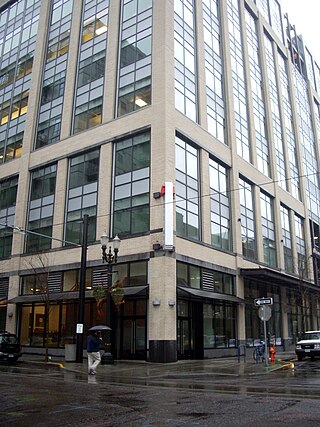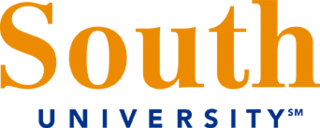
The Art Institute of Seattle was a private for-profit art school in Seattle, Washington. The school was one of a number of Art Institutes, a franchise of for-profit art colleges with many branches in North America, owned and operated by Education Management Corporation. EDMC owned the college from 1982 until 2017, when, facing significant financial problems and declining enrollment, the company sold the Art Institute of Seattle, along with 30 other Art Institute schools, to Dream Center Education, a Los Angeles–based Pentecostal organization, before shuttering.
The Art Institutes (AI) were a private for-profit system of art schools in the United States.
Perdoceo Education Corporation (PRDO) is a public company that owns four for-profit universities in the United States: American Intercontinental University, Colorado Technical University, California Southern University, and Trident University International. The company was previously known as Career Education Corporation.
The Art Institute of Pittsburgh was a private art college in Pittsburgh, Pennsylvania. The school emphasized design education and career preparation for the creative job market. It was founded in 1921 and closed in 2019.

Illinois Institute of Art – Chicago was a for-profit art and culinary school in Chicago, Illinois. It briefly operated as a non-profit institution before it closed in 2018. The school was one of a number of Art Institutes, a franchise of for-profit art colleges with many branches in North America, owned and operated by Education Management Corporation. EDMC owned the college from 1975 until 2017, when, facing significant financial problems and declining enrollment, the company sold the Illinois Institute of Art – Chicago, along with 30 other Art Institute schools, to Dream Center Education, a Los Angeles–based Pentecostal organization.

The Art Institute of Portland was a for-profit art school in Portland, Oregon, which briefly operated as a non-profit institution before it closed in 2018. The school was one of a number of Art Institutes, a franchise of for-profit art colleges with many branches in North America, owned and operated by Education Management Corporation. EDMC owned the college from 1998 until 2017, when, facing significant financial problems and declining enrollment, the company sold the Art Institute of Portland, along with 30 other Art Institute schools, to Dream Center Education, a Los Angeles–based Pentecostal organization. Dream Center permanently closed 18 Art Institute schools, including the Art Institute of Portland, at the end of 2018.
Western State College of Law at Westcliff University is a private, for-profit law school in Irvine, California. It offers full and part-time programs and is approved by the American Bar Association. Western State pays a fee to receive services from the Association of American Law Schools (AALS).

The Art Institute of Colorado was a for-profit art and culinary school in Denver, Colorado., United States. It briefly operated as a non-profit institution before it closed in 2018. The school was one of a number of Art Institutes, a franchise of for-profit art colleges with many branches in North America, owned and operated by Education Management Corporation. EDMC owned the college from 1975 until 2017, when, facing significant financial problems and declining enrollment, the company sold the Art Institute of Colorado, along with 30 other Art Institute schools, to Dream Center Education, a Los Angeles–based Pentecostal organization. Dream Center permanently closed 18 Art Institute schools, including the Art Institute of Colorado, at the end of 2018.

The Chicago School is a private university with its main campus in Chicago, Illinois. Established in 1979, The Chicago School was primarily focused on the professional application of psychology. It currently has about 6,000 students across all campuses and online. The university offers more than 30 academic programs in professional fields such as psychology, business, health care, health services, education, counseling, and nursing.
Brown Mackie College was a private for-profit college system in the United States. The colleges offered bachelor's degrees, associate degrees, and certificates in programs including early childhood education, information technology, health sciences, and legal studies. Brown Mackie's schools were most recently owned by Education Management Corporation (EDMC).

South University is a private for-profit university with its main campus and online operations in Savannah, Georgia, United States. Founded in 1899, South University consists of its School of Pharmacy, College of Nursing and Public Health, College of Health Professions, College of Business, College of Theology, and College of Arts and Sciences. The university is accredited by the Southern Association of Colleges and Schools Commission on Colleges.

The Art Institute of Fort Lauderdale is a former for-profit art and culinary school in Fort Lauderdale, Florida which closed in 2018. The school was one of a number of Art Institutes, a franchise of for-profit art colleges with many branches in North America, owned and operated by Education Management Corporation (EDMC). EDMC owned the college from 1973 until 2017, when, facing declining enrollment, multiple fraud charges brought by faculty and students, and accreditation issues at some of its schools, the company sold the Art Institute of Fort Lauderdale, along with other properties, to Dream Center Education, a Los Angeles-based Pentecostal organization. Dream Center Education planned to operate the school, along with others it acquired, as a non-profit. The plan proved unsustainable, with Dream Center permanently closing 18 Art Institute schools, including Art Institute of Fort Lauderdale, at the end of 2018.
The Art Institute of York – Pennsylvania was a for-profit college, part of The Art Institutes, a system of over 35 education institutions throughout North America, providing education in design, media arts, fashion and culinary arts.
The Art Institute of Las Vegas was a for-profit college in Henderson, Nevada. It was founded in 1983 as The Interior Design Institute and was later known as The Design Institute. It was renamed The Art Institute of Las Vegas in 2001 when it was purchased by Education Management Corporation, which was headquartered in Pittsburgh, Pennsylvania. Ai-Las Vegas was part of a system of Art Institutes schools. It was one of the colleges acquired from EDMC by Dream Center Education Holdings (DCEH), LLC, in 2017. It closed in December 2019.
The Art Institute of Houston was a private for-profit art school in Houston, Texas. It is owned by Education Principle Foundation. Founded in 1965 as the Houston School of Commercial Art, the school joined The Art Institutes system of schools in 1978 and moved to its final facility in 1990. All Art Institute schools closed on September 30, 2023.
The Art Institute of Charlotte was a for-profit art school in Charlotte, North Carolina. It was briefly operated as a non-profit institution before it closed in 2018. The school was one of a number of Art Institutes, a franchise of for-profit art colleges with many branches in North America, owned and operated by Education Management Corporation. EDMC owned the college from 1999 until 2017, when, facing significant financial problems and declining enrollment, the company sold the Art Institute of Charlotte, along with 30 other Art Institute schools, to Dream Center Education, a Los Angeles-based Pentecostal organization. Dream Center permanently closed 18 Art Institute schools, including the Art Institute of Charlotte, at the end of 2018.
Education Management Corporation (EDMC) was a Pittsburgh, Pennsylvania-based operator of for-profit post-secondary educational institutions in the United States and Canada. The company was founded in 1962. At its peak in 2011, Education Management Corporation operated 110 schools through its higher education divisions: Argosy University, The Art Institutes, Brown Mackie College, and South University, and enrolled 158,300 students.
Michael K. Clifford is an American education investor and consultant, and a proponent of education.
For-profit colleges, also known as proprietary colleges, are post-secondary schools that rely on investors, and survive by making a profit. They include for-profit vocational and technical schools, career colleges, and predominantly online universities. For-profit colleges have frequently offered career-oriented curricula including culinary arts, business and technology, and health care. These institutions have a long history in the US, and grew rapidly from 1972 to 2009. The growth of for-profit education has been fueled by government funding as well as corporate investment, including private equity.
Todd S. Nelson is an American businessman who has been the CEO of three of America's largest for-profit college chains: Apollo Group, Education Management Corporation, and Career Education Corporation. He is currently the Executive Chairman of Perdoceo Education Corporation, the parent company of Colorado Technical University, American Intercontinental University, and Trident University International.






